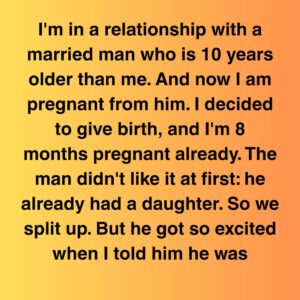I used to think love meant carrying everything so no one else had to.
Before the sun was up, I’d sweep the kitchen floor. Restock the cupboards. Fold clothes that somehow always appeared, no matter how many loads I washed. I kept the baby fed and changed, my teenager barely on time for school, and made sure my husband came home to a hot meal, fresh clothes, and a shoulder to lean on when exhaustion clung to him like concrete dust.
Doing it all seemed like enough.
Until the day my son laughed at me in front of his friends.
That’s when something broke.
I realized: being the backbone of a family doesn’t stop them from pretending you’re invisible.
I’m Marissa. I have two sons.
Lucas is fifteen—bright, sharp-tongued, perpetually annoyed. He moves through the house with his earbuds in and sarcasm at the ready. He used to kiss my cheek goodnight. Now I’m lucky to get a grunt.
Then there’s Caleb.
Six months old and soft as moonlight. A wiggly bundle of night feedings and dawn cuddles. He clings to me with chubby fingers and cries if I’m out of sight. Sometimes when I rock him at 2 a.m., I wonder if one day he’ll grow up and look straight through me, too.
My husband, James, works construction. Grueling hours. Heavy boots. He’s a good man in many ways—but lately he’s been less man, more weight. He comes through the door dragging his bones, kicks off his boots, and sinks into the couch like it owes him rest.
“I bring home the paycheck,” he says, like a badge. “You just keep things cozy.”
He smirks when he says it. As if my contribution is scented candles and soft throw pillows.
I used to laugh along.
Until the joke stopped being funny.
Rot sets in slowly—like the smell under the sink when no one checks the sponge. The repetition becomes insult. Each echo tightens around your chest until breathing feels like a chore you forgot to write down.
And Lucas? He watches everything.
He mimics his father’s tone now—the same dismissive lilt, the same smug certainty that the world is his and I’m just the furniture holding it up.
“You don’t even work, Mom,” he said once, shrugging. “You just clean and do mom stuff.”
Another day: “Must be nice, napping with the baby while Dad breaks his back.”
He said that while I stood at the sink, elbow-deep in suds, rocking Caleb’s carrier with my foot.
Words crash like dishes sometimes. Sharp. Startling. Unnecessary.
Where am I in this house? Mostly behind the scenes—bent over laundry, balancing bottles, wiping surfaces that never stay clean.
Somewhere along the way, I stopped being Marissa.
I became background noise.
On Thursday, Lucas invited two friends over after school. I’d just changed Caleb and was folding laundry in the living room—onesies in one hand, pacifier in the other.
The boys were in the kitchen. They whispered at first, then got loud enough for me to hear.
“Man, your mom’s always folding stuff,” one said, laughing. “Her whole vibe is broomsticks and burp cloths.”
“At least your dad has a real job,” another joked. “That’s how you got that PS5, right?”
Then Lucas, with the ease of someone tossing a pebble into a pond:
“Guys, she’s living her dream. Some women just like being maids.”
Their laughter was instant. Loud. Sharp.
Something inside me cracked.
Not rage. Not sadness. Something quieter. Cold and clear.
I didn’t cry. I didn’t yell.
I stood up, walked into the kitchen, and smiled so wide it hurt.
“Eat up, boys,” I said, placing a fresh plate of cookies on the counter. “One day, you’ll learn what real work looks like.”
They chuckled, awkward now.
I went back to my folding.
That’s when I made my decision.
Not out of fury—but out of clarity.
They had no idea I’d been building something for months.
In between naps and night feedings, I’d been sneaking moments—watching YouTube tutorials on editing software, applying for freelance jobs, brushing up on grammar rules with Caleb curled against my chest.
What they thought was scrolling through Instagram was me building a future.
A small trickle of income had started coming in—$30 here, $50 there. Editing. Translations. Simple tasks. But it was mine.
Every dollar I made went into a separate account.
And then, after that day in the kitchen, I used it.
I packed a diaper bag. Slid Caleb into the sling. And rented a tiny cottage in the woods for a week.
No fight. No announcement. No permission.
Just a note on the counter:
Took Caleb. Needed air.
You may decide who will “just clean all day” this week.
—The Maid.
The cottage smelled like pine and stillness.
Caleb and I went on slow walks. I drank coffee while it was still hot. I read books out loud—not to soothe or distract, but to hear my voice again.
Nobody needed me for anything.
And it felt like breath after holding it for years.
When I came back a week later, the house was a disaster.
Takeout boxes stacked on the counter. Sour milk in the sink. Socks everywhere.
Lucas opened the door. He looked smaller somehow—his usual arrogance wilted. His voice cracked.
“I didn’t know it was… all that,” he whispered. “I thought you just… wiped stuff down.”
James stood behind him. Quiet. Hollow.
“I said things I shouldn’t have,” he admitted. “I didn’t realize your weight.”
I didn’t say anything.
I kissed Lucas on the forehead, stepped over a sticky juice puddle, and walked into my kitchen.
Something had shifted.
They had seen.
Now?
Lucas does his own laundry. Not well, but earnestly. He stacks dishes—even if crooked. He makes me tea in the evenings. Sometimes he lingers by my side, awkward but present.
Trying.
James cooks twice a week. No fanfare. No jokes. He just pulls out the cutting board and chops. One night, he asked me where we kept the cinnamon.
And I knew then—he was trying to ask, not assume.
They both say “thank you” now.
Not loudly. But often.
And me?
I still clean. Still cook. But not out of obligation. Not to prove my worth.
I do it because this is my home.
And I’m no longer the only one holding it together.
The freelance work is steady now. Bigger contracts. Real clients. Real income. I set the hours. I decide.
Because they saw me after I disappeared.
And I came back on my terms.
It was never about running away.
It was about reminding them that I had always been the glue—and that even glue cracks when you pretend it doesn’t matter.
The part that stung the most?
Not the chores.
The erasure.
No one ever asked if I was okay. Not after sleepless nights with a feverish baby. Not while scraping burnt lasagna from a pan while everyone else napped. Not when my coffee went cold on the counter for the fifth morning in a row.
So I left.
Not in anger—but with the calm of a woman who finally valued herself.
Sometimes, the quietest departure is the loudest cry for respect.
When the floors stayed dirty, when socks didn’t magically reappear, and dinner didn’t just appear hot on the table?
They noticed.
Lucas doesn’t walk past me folding laundry anymore.
He asks, “Need help, Mom?”
Sometimes I say yes. Sometimes I don’t.
But he asks.
And James? He doesn’t call me “the maid” anymore.
He calls me Marissa.
The woman who held everything together—even when no one noticed.
The one who finally let go, just long enough for them to see what falling apart looked like.





